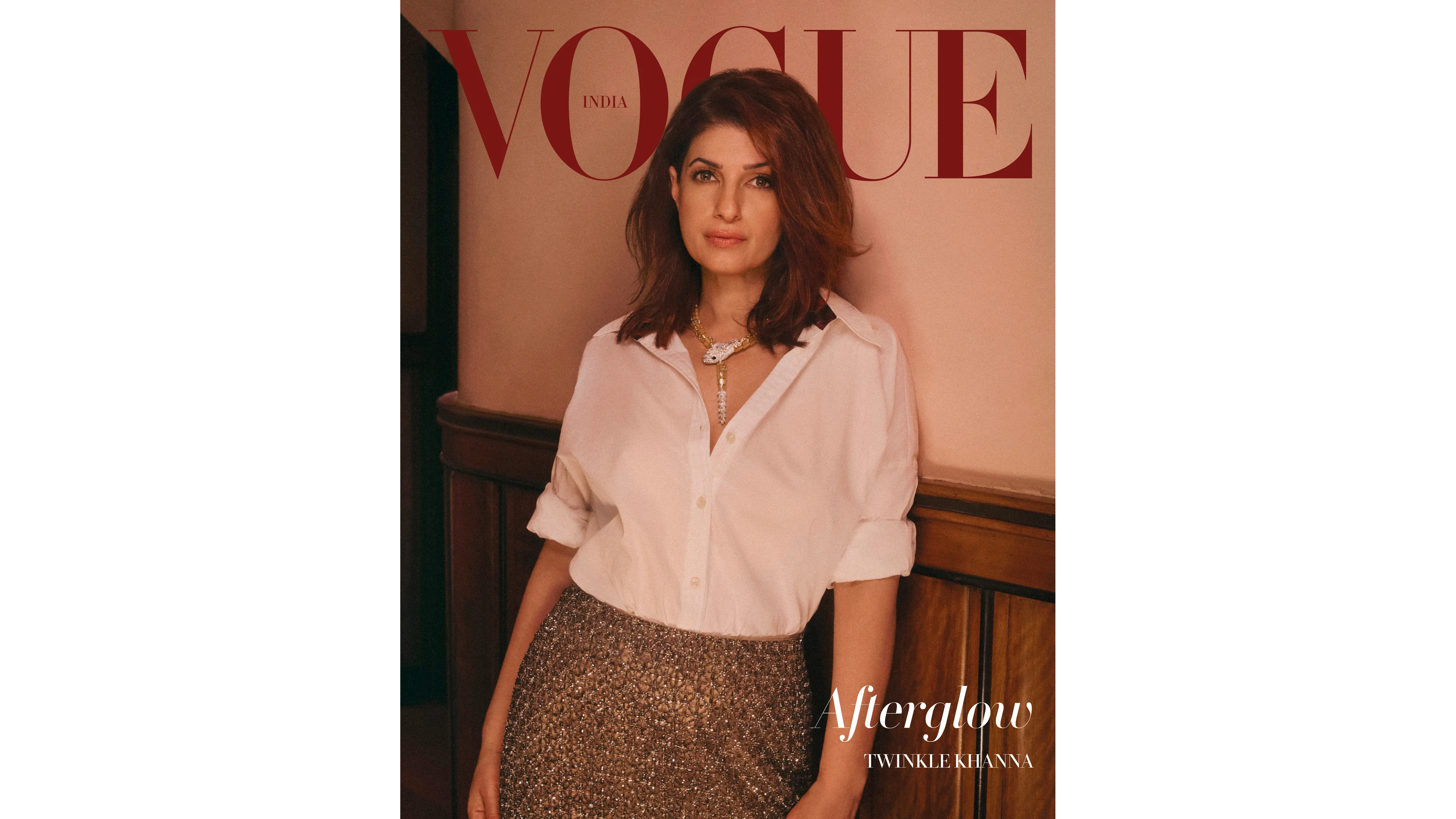By Ankita Shah
Copyright vogue

At the launch of her 2023 book, Welcome to Paradise, Twinkle Khanna was asked why her protagonists are primarily older women. She answered that their lives are richer, more textured, but ignored. “When an old person puts on a hearing aid, the people around them seem to turn deaf to their stories,” she added.
I think of those words when we sit in her sunlit office facing Juhu beach, and she tells me how she pictures herself striding into her 60s. “Either I am riding my scooter in Goa, nails chipped, hair uncombed, or I am doing a PhD. Maybe not the scooter, because if I fall, I might not recover from that.” She laughs, and I see a woman refreshingly at ease with growing older. It is unusual, given that the first port of call in her long career was the youth-obsessed film industry, which never quite allowed her to escape public scrutiny.
In any case, ageing, for women, is a tussle. With the body. With the world. The female body is always in flux, and its transitions ask us to constantly relearn and adjust how to inhabit ourselves. The world, too, changes its gaze. In youth, we are seen—whether we want it or not. But just as we age into a surer sense of self, craft and authority, the scrutiny shifts toward our sexuality, our indulgences, our appetite for pleasure. It feels like a constant negotiation with the terms of the world and the terms of our bodies. Which is why Khanna’s comfort with ageing is striking.
That comfort took its time finding her. Khanna made her acting debut at 22 with Barsaat (1995). Six years later, she left the movies and never looked back. “My guard was so high at that point. I wasn’t ready to experience or even acknowledge to myself what I was really feeling. How could I have portrayed someone else?” she asks herself more than me. Since quitting films, she’s founded an interior design company, turned her mother’s candle-making hobby into a business, launched a digital media platform, produced a film and written four books, while maintaining a newspaper column for over a decade. All this while bringing her whole, unabashed self before the camera for promotions, interviews and talk shows. Ten years ago, at the launch of her very first book, Mrs Funnybones, when asked if he thought she was good at acting, Aamir Khan described her as “good at activities like insulting people”.
Now at 51, cohosting the celebrity talk show Two Much on Prime Video alongside Kajol, Khanna gets paid to roast her former colleagues—Aamir Khan included. In addition to her wickedly good potshots, the former star is also 25,000 words into her next manuscript. Her professional life has had a kind of ongoingness, of pursuing one curiosity after another, of even extending this same curiosity to growing older. When I ask her what her 50th birthday was like, she reaches for a metaphor. “Turning 50 is a railway journey. Even if it’s to Ulhasnagar and not a destination you particularly want to reach, you still want to get there and just get off the train.”
There’s no denying that being the daughter of Rajesh Khanna and Dimple Kapadia has opened doors for Khanna throughout her life, but what opened the author’s own mind, as a child, was her predilection for books. “I [heard] a theory about how you are what’s on your shelf by the age of 11.” On Khanna’s were the books she’d read, half a book of bad poems she had written, sketches of jewellery and furniture and certificates of elocutions and plays. Nothing she has done in the years since has moved away from that. “I am intensely curious and extremely bored at the same time,” she says, an admission that explains her plans to study philosophy, having only recently completed her MA in fiction writing from Goldsmiths, University of London in 2024.
This kind of continuity is rare and hard. One, because what a girl wants at 11 rarely survives the edits of social expectation or interference. Two, some shelves get stocked with the minutiae of motherhood for an entire decade or two. Continuity requires privilege, but I suspect it also requires a certain level of zaniness.
“I don’t think that I have lived particularly within the confines of a gender in my head. I grew up in an all-female household and didn’t even realise that patriarchy existed till I was out in the world. And probably until my 30s, it didn’t hit me. I believed women were superior. And nothing that I experienced, maybe because I started off with that outlook, really deterred me from that perspective.” It is what she calls the making of an androgynous mind. What Virginia Woolf once described as “resonant and porous… naturally creative, incandescent and undivided”.
Maybe to be unruffled by ageing, we have to become porous. We have to blur the lines that appear as ruptures in our careers. We have to abandon the language of prime or decline. Experience time as continuous by only paying attention and having allegiance to our curiosities.
That same allegiance, for Khanna, might have enabled steering independent of her parents’ legacy or her husband’s filmography. In India, where ‘do jism ek jaan’ is the shorthand for marriage, Khanna insists that the only person she represents is herself. She is not responsible for anyone else’s words or actions; it’s her voice, her opinions. She is baffled by those who think marriage is two amoebae merging their membranes.
What she has inherited from her mother is her insouciance for ageing. “She’s pretty blasé about it, and I’m blasé about it too. My grandmother, on the contrary, thought every hair had to be dyed, every nail perfect. She would look at us and say, ‘What are you two doing?’” That fussing has also been carried forward. Khanna recalls standing in the drizzle during her son’s birthday party while her mother anxiously adjusted her hair. “She kept saying, ‘This side is higher than the other.’ And of course, I do it to my kids as well. The family tradition we’re passing down is basically just fidgeting with each other’s hair.”
And yet, it’s not all anxiousness or correction. Wit also makes it to the hand-me-downs. She tells me that recently her daughter, Nitara, ordered her to “stand on that step” as punishment. “I said, ‘I’m used to being on a pedestal, so I’ll stand here.’ She shot back, ‘If you want to go even higher, just climb up your ego.’ I thought, ‘Wow, that’s a great line, it will go in my column.’”
On the day of the cover shoot, a rainy afternoon in September, a crew gathers to photograph Khanna inside the storied Liberty Cinema in Mumbai. She’s wearing a crisp white shirt tucked into a light-gold sequinned skirt, both by JADE. Her sleeves are folded around her elbows—like she means business. Coiled around her neck is a BVLGARI Serpenti necklace, its scales set in diamonds. It’s a motif I’ve seen on her before—the Serpenti Tubogas seven-spiral watch that she owns is often spotted snaking up her wrist. “This side of me has only come about after I turned 50,” she laughs. “I am suddenly interested in handbags, too. Is that my midlife crisis? Actually, yeah, that is my midlife crisis.”
The shutters go off. Khanna’s burgundy hair lifts lightly with the air blower. She looks away, then back at the camera, her gaze intense, her body leaning slightly in resignation to return to her life beyond the spotlight and the yearning to hang back and bask in it. Khanna’s guard is lower now, she admits. And it makes sense, this ease before the camera, this willingness to show who she is.
Toward the end of our conversation, she also invokes Ursula K Le Guin, an author we both love, and her 1992 essay, ‘Dogs, Cats, and Dancers: Thoughts about Beauty’, where she writes about the beauty ideal always being a youthful one. “Beauty visits us when we’re young,” Khanna says, not with the superiority of age but in the spirit of being an eternal student. “There is the beauty of firm and clear skin, and there is the beauty of a firm and clear mind. From a young age, I have wanted to hone the latter.”
Photographed by Manasi Sawant
Styled by Divya Balakrishnan
Hair and makeup: Namrata Soni
Bookings editor: Aliza Fatma
Entertainment director: Megha Mehta
Senior entertainment editor (consultant): Rebecca Gonsalves
Production: Imran Khatri Productions
Assisted by: Michelle Lobo (styling); Komal Vora, Ridhi Matreja, Shweta Sharma (hair and makeup); Aparna Gunaranjan (bookings); Radhika Chemburkar (production)
At 50, Twinkle Khanna knows how to stay in the spotlight without getting sunburnt
Twinkle Khanna shows us around her top spots in London like a bona fide local
Twinkle Khanna: “Once you laugh at something, you can never see it in the same light again”



